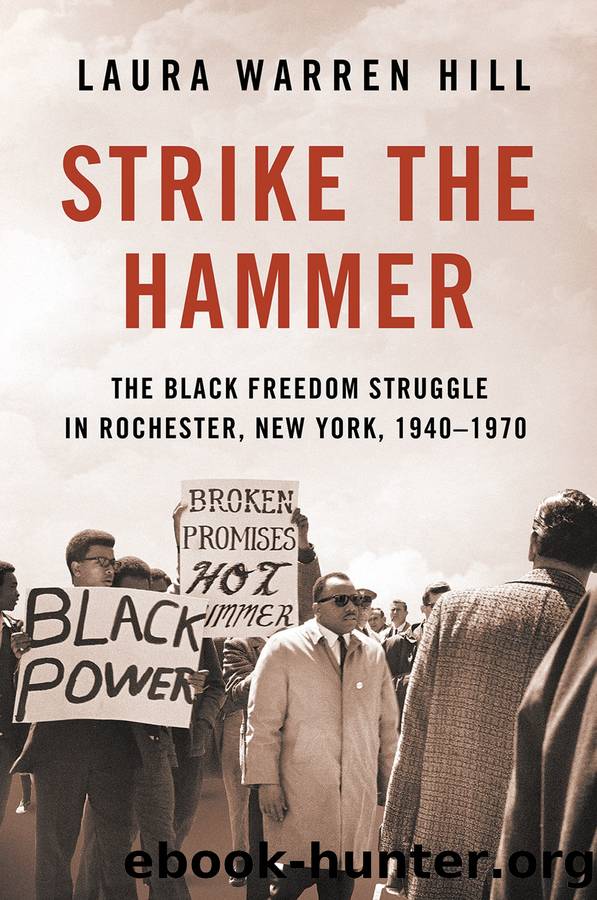Strike the Hammer: The Black Freedom Struggle in Rochester, New York, 1940â1970 by Laura Warren Hill

Author:Laura Warren Hill [Hill, Laura Warren]
Language: eng
Format: epub
Tags: History, United States, State & Local, Middle Atlantic (DC; DE; MD; NJ; NY; PA), Social Science, Discrimination, Political Science, Civil Rights
ISBN: 9781501754418
Google: EM_1DwAAQBAJ
Publisher: Cornell
Published: 2021-04-15T13:56:13+00:00
CHAPTER 5
Confrontation with Kodak
Corporate Responsibility Meets Black Power
During its 1966 annual convention, the FIGHT organization prepared to increase its profile in the city of Rochester. The organizationâs leaders recognized that to remain a powerful force, they must tackle the problem of the so-called hard-core unemployed. Largely ghetto-bound, the hard-core unemployed lacked the required education and training, skills, and prior experience to work in industrial settings; for some, criminal records and spotty employment histories further plagued them. Despite evidence to the contrary, many in Rochesterâand across the nationâbelieved it was this population that was most likely to incite and participate in urban unrest. To prevent further outbreaks of ârioting,â local, state, and national government, along with many in business, believed the hard-core unemployed needed incorporation into the mainstream economic systems. Certainly in Rochester, where unemployment was at 1.8 percent (the lowest of the thirty-nine major industrial areas in the United States) and ten thousand jobs went unfilled, this should have been a reasonable task to accomplish.1 Yet in the midst of the now-famous urban crisis, many in business and government believed the hard-core unemployed were âunreachable.â To be worth their salt, then, self-professed âghetto organizationsâ such as FIGHT needed to demonstrate they could reach and sustain this population, turning them into âproductiveâ members of society. No longer an upstart organization struggling to be recognized, FIGHT dedicated itself to assisting the urban Black unemployed. In the ensuing process, it demanded that Rochesterâs largest employer, the Eastman Kodak Company, the international film conglomerate headquartered in Rochester, share this responsibility by partnering with FIGHT and supporting its program for training and job creation.
For its part, the Eastman Kodak Company had been operating successfully in Rochester for nearly eighty years and had earned admiration locally and in the larger business world. By 1966, Kodak ranked thirty-five on Fortuneâs list of Americaâs largest corporations and was climbing.2 Kodak was nationally known for its philanthropic support of arts, education, and healthcare, and for providing cradle-to-grave insurance and care for its employees. For its continuous ability to circumvent labor unions, Kodak was something of a corporate anomaly in the postwar era, making it a likely partner for FIGHTâs job creation program.3 Certainly in Rochester it had no industrial equal, employing a full 13 percent of the cityâs population, with several local sources estimating that nearly 40 percent of the city was either employed by Eastman Kodak or had a family member in the companyâs service. Driven by several consecutive years of record sales and growth, the companyâs influence in Rochester grew alongside its sizable donations to community institutions. But these great contributions came at a price to the community. Kodak enjoyed and expected the deference that accompanied its annual giving and had for some time asserted its right to rule the city by paternalistic philanthropy. Kodak directed; it did not take direction from others.
Still, as one reporter put it, âKodak is considered both a good place to work and a good corporate citizen. The first to be asked to contribute to any cause, Kodak knew Fight [sic] would be calling.
Download
This site does not store any files on its server. We only index and link to content provided by other sites. Please contact the content providers to delete copyright contents if any and email us, we'll remove relevant links or contents immediately.
The Secret History by Donna Tartt(19011)
The Social Justice Warrior Handbook by Lisa De Pasquale(12179)
Thirteen Reasons Why by Jay Asher(8878)
This Is How You Lose Her by Junot Diaz(6866)
Weapons of Math Destruction by Cathy O'Neil(6253)
Zero to One by Peter Thiel(5776)
Beartown by Fredrik Backman(5722)
The Myth of the Strong Leader by Archie Brown(5487)
The Fire Next Time by James Baldwin(5418)
How Democracies Die by Steven Levitsky & Daniel Ziblatt(5207)
Promise Me, Dad by Joe Biden(5137)
Stone's Rules by Roger Stone(5070)
A Higher Loyalty: Truth, Lies, and Leadership by James Comey(4942)
100 Deadly Skills by Clint Emerson(4906)
Rise and Kill First by Ronen Bergman(4766)
Secrecy World by Jake Bernstein(4733)
The David Icke Guide to the Global Conspiracy (and how to end it) by David Icke(4693)
The Farm by Tom Rob Smith(4494)
The Doomsday Machine by Daniel Ellsberg(4477)
